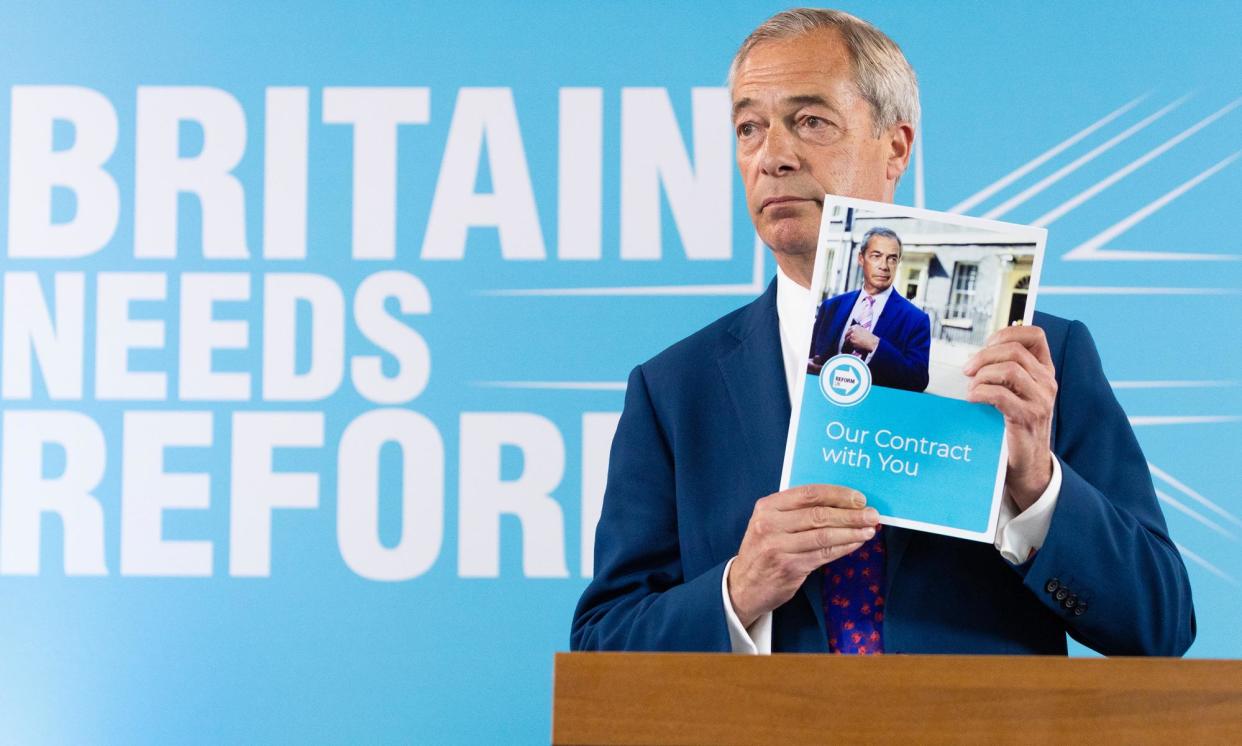Farage unveils Reform UK’s £140bn pledges that economists say ‘do not add up’

Nigel Farage has unveiled a raft of populist pledges, massive tax cuts and £140bn in spending commitments in a Reform UK manifesto that economists said did “not add up”.
The Conservative party, which has struggled to counter the growing Reform threat, accused Farage of being part of a “great entertainment machine” who was not somebody who could govern the country.
Labour strategists believe Reform, which held its manifesto launch in the opposition’s south Wales heartlands, does not represent a serious risk because the party is so poorly organised and is likely to have seen its vote squeezed by the Tories on election day.
Farage, however, said he wants Reform UK to establish a “bridgehead” in parliament with a view to a full assault in five years’ time, suggesting he could be in No 10 following the next general election.
As he launched his party’s set of election promises, Farage said: “We are not pretending that we are going to win this general election. This election is for our party, and for me, the first important step on the road to 2029.
“Our ambition is to establish a bridgehead in parliament, and to become a real opposition to a Labour government.”
Reform UK’s plans imply spending an extra £141bn a year on tax cuts and other policy pledges, paid for by £156bn of savings in public spending and an assumption of increased tax revenue from higher economic growth.
But the Institute for Fiscal Studies thinktank said the party’s plans were based on “extremely optimist assumptions” about growth and the sums “do not add up”, meaning the manifesto as a whole was “problematic”.
“Whilst Reform’s manifesto gives a clear sense of priority, a government could only implement parts of this package, or would need to find other ways to help pay for it, which would mean losers not specified,” it added.
Reform’s plans for tax cuts included raising the minimum threshold of income tax to £20,000 a year, abolishing stamp duty, scrapping VAT on energy bills and getting rid of inheritance tax for all estates under £2m.
Farage was asked about comparisons between Reform’s plans and former prime minister Liz Truss’s disastrous mini-budget. “I don’t want to work with the Office for Budget Responsibility. They’re part of the problem, not part of the solution.” Truss’s chancellor, Kwasi Kwarteng, avoided publication of OBR analysis alongside the mini-budget, undermining its credibility
The manifesto included axing the net zero strategy, introducing life imprisonment for convicted drug dealers, a “freeze” on non-essential immigration “to protect our culture and identity” and 20% tax relief on all private healthcare and insurance.
Reform last week overtook the Tories in a poll for the first time, with YouGov putting Farage’s party on 19%, ahead of the Tories on 18%, although other pollsters have found a wider gap. Labour remained far ahead of both on 37%.
Cabinet minister Michael Gove dismissed as “ridiculous” Farage’s claim that he could make a bid for No 10 in 2019, telling Times Radio that the British public would go for a more authoritative leader from the left or the right.
“He is part of a great entertainment machine. He is not someone who can govern this country. Reform is a giant ego trip, not a serious programme of alternative change. Nigel Farage provides amusement and diversion. What he does not provide is authority and good governance.
“In this country, whoever we vote for in the end, the British people choose authoritative, sensible managers, whether from the left or the right. What they don’t do is go in for the performative politics that Nigel has made such a successful financial career out of.”
Giles Watling, the incumbent Tory MP in Clacton, who won the formerly Ukip-held seat in 2017, said it was important for his party to not dismiss the worries of Reform-leaning voters.
“We don’t have to take Nigel Farage particularly seriously, but we do have to take Reform seriously, and the people who are listening to Farage, and are being appealed to on an emotional level,” he said.
“When a country goes through hard times, like with the pandemic and war, populist leaders crop up, people who hold rallies rather than talking to people on doorsteps, and if they do talk to people on doorsteps it’s a photo opportunity.”
Another Tory MP added: “We need to convince people that elections and a decent opposition are too important to waste their vote on a protest or wishful thinking. Even if we have to do so in an apologetic tone.”
Both the Conservatives and Labour chose not to engage with the policy detail in Reform’s document, with Keir Starmer seeking to distance himself from questions on Farage’s plan to woo voters in Labour heartlands.
Starmer said during a visit to Southampton that the election was “a straight choice between Conservatives and Labour”, which could benefit his Tory opponents but may do little to detract attention from Farage.
Labour strategists said that Reform UK was primarily taking support from the Tories, but they predicted that Rishi Sunak would widen the gap with Farage’s party by polling day.
“Reform could yet be the dog that doesn’t bark. Some support could slope off and they could end up with just 8% of the vote,” one said.
The Tories have shifted their electoral strategy to warning against Labour winning a “super-majority” even bigger than Labour’s 1997 landslide victory, with attack ads focused on Keir Starmer and the prime minister under pressure from some Tories to “go for the jugular”.
Grant Shapps became the first Tory minister to publicly acknowledge the party is unlikely to win the election. “It’s possible to win the election. Do I accept it’s not the most likely outcome? Yes, I accept that. I’m a realist.”

 Yahoo News
Yahoo News 